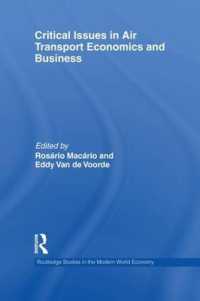- ホーム
- > 洋書
- > ドイツ書
- > Mathematics, Sciences & Technology
- > Technology
- > heat engineering, energy engineering, nuclear engineering
Full Description
This book comprehensively analyzes the challenges and opportunities associated with transitioning to sustainable energy systems in Latin America. Recognizing that energy transition goes beyond mere changes in energy systems, it is also essential to address the imperative of ensuring a just transition and equitable benefits for all, particularly for vulnerable populations. This recognition emphasizes prioritizing social equity and inclusivity throughout the energy transition process. By adopting a critical perspective grounded in multidisciplinary approaches from the social sciences, the book delves into the complex energy transition issues, exploring the broader social, economic, and political dimensions involved.
The book is divided into four parts. Part I highlights the changing energy mix in Latin America and the geopolitical implications of the increasing reliance on renewable sources. Part II examines the dilemmas faced by countries that rely on oil and gas revenues andthe obstacles they face in transitioning to a low-carbon economy. Part III analyzes the production, technology, and costs as limits and opportunities for energy transition and adoption of renewable energies. Finally, part IV explores energy access and the democratization of energy generation in Latin America, including efforts to address energy poverty, the growth of distributed energy, and prosumers.
Energy Transitions in Latin America: The Tough Route to Sustainable Development is a valuable resource that will benefit researchers in energy studies and policymakers alike. It serves as a comprehensive guide for those seeking to navigate the complexities of energy transitions. It is an essential source for fostering informed decision-making and driving sustainable development in the region.
Contents
Chapter 1. Energy transition in Latin America: Historic perspective and challenges in achieving sustainable development goals.- Part 1: Energy, climate change and sustainable models: Energy mix and national decarbonization plans.- Chapter 2. Energy transition and climate justice after Paris Agreement: achievements and new goals in South America.- Chapter 3. Geopolitical dimension and social - geopolitics of renewable energy in Latin America.- Chapter 4. Energy matrix transformation in Latin America: the global political economy of Chinese Investments.- Part 2: Oil and gas dilemmas: Income's dependence and obstacles to the energy transition.- Chapter 5. The dispute for Mexico's energy transition under dependent conditions. A critical energy studies approach.- Chapter 6. Contradictions between energy and climate change mitigation policy in a country with oil reserves: the case of Mexico.- Chapter 7. Between oil dependence and energy sovereignty: the limits of the energy transition in Ecuador.- Chapter 8. Energy transition and consumption subsidies in oil-exporting countries: Venezuela and Ecuador between a rock and a hard place.- Chapter 9. The Brazilian hydrocarbon dilemma: did Brazil hit the big ticket too late?.- Chapter 10. Transition policies as a local problem. The cases of Neuquén and Río Negro (Argentine Patagonia).- Part 3: Energy transitions and renewable energies: Production mix, technology, and costs as limits and opportunities.- Chapter 11. Renewable energies in Argentina. The challenge of articulating the energy transition with the economic development model.- Chapter 12. The "wind Revolution" in Uruguay and the role of the public sector in guiding energy transitions.- Chapter 13. Energy transition: an analysis of private and public agents working toward energy sustainability in Colombia.- Chapter 14. Solar energy and social-productive configurations: regional features of the energy diversification process in Argentina.- Chapter 15. Uncertainties about the transport planning in Brazil in the context of climate change: tradition (biofuels) or innovation (electric mobility)?.- Chapter 16. Factors that contribute to the diffusion of solar PV energy: evidence from Holambra in São Paulo Macrometropolis, Brazil.- Part 4: Energy services: Access, energy poverty, decentralization, and democratization.- Chapter 17. Shifting powers towards decentralized energy generation. a comparative perspective between Argentina, Chile, and Uruguay.- Chapter 18. Unfolding the relationship between poverty and energy consumption in Brazil. A first step toward the energy poverty debate.- Chapter 19. Energy inequality in Central America: concept, challenges, and opportunities.- Chapter 20. Energy planning evolution, energy transition, and sustainable development goals, keynotes from Latin America and Nicaragua,- Chapter 21. Conclusions: Energy transition agenda for sustainable development in Latin America.








